Data Management
Practical Guides for Librarians
 About the Series
About the Series
This innovative series written and edited for librarians by librarians provides authoritative, practical information and guidance on a wide spectrum of library processes and operations.
Books in the series are focused, describing practical and innovative solutions to a problem facing todays librarian and delivering step-by-step guidance for planning, creating, implementing, managing, and evaluating a wide range of services and programs.
The books are aimed at beginning and intermediate librarians needing basic instruction/guidance in a specific subject and at experienced librarians who need to gain knowledge in a new area or guidance in implementing a new program/service.
 About the Series Editor
About the Series Editor
The Practical Guides for Librarians series was conceived by and is edited by M. Sandra Wood, MLS, MBA, AHIP, FMLA, Librarian Emerita, Penn State University Libraries.
M. Sandra Wood was a librarian at the George T. Harrell Library, the Milton S. Hershey Medical Center, College of Medicine, Pennsylvania State University, Hershey, PA, for more than thirty-five years, specializing in reference, educational, and database services. Ms. Wood worked for several years as a development editor for Neal-Schuman Publishers.
Ms. Wood received an MLS from Indiana University and an MBA from the University of Maryland. She is a fellow of the Medical Library Association and served as a member of MLAs Board of Directors from 1991 to 1995. Ms. Wood is founding and current editor of Medical Reference Services Quarterly , now in its thirty-fifth volume. She also was founding editor of the Journal of Consumer Health on the Internet and the Journal of Electronic Resources in Medical Libraries and served as editor/coeditor of both journals through 2011.
Titles in the Series
How to Teach: A Practical Guide for Librarians by Beverley E. Crane
Implementing an Inclusive Staffing Model for Todays Reference Services: A Practical Guide for Librarians by Julia K. Nims, Paula Storm, and Robert Stevens
Managing Digital Audiovisual Resources: A Practical Guide for Librarians by Matthew C. Mariner
Outsourcing Technology: A Practical Guide for Librarians by Robin Hastings
Making the Library Accessible for All: A Practical Guide for Librarians by Jane Vincent
Discovering and Using Historical Geographic Resources on the Web: A Practical Guide for Librarians by Eva H. Dodsworth and L. W. Lalibert
Digitization and Digital Archiving: A Practical Guide for Librarians by Elizabeth R. Leggett
Makerspaces: A Practical Guide for Librarians by John J. Burke
Implementing Web-Scale Discovery Services: A Practical Guide for Librarians by JoLinda Thompson
Using iPhones and iPads: A Practical Guide for Librarians by Matthew Connolly and Tony Cosgrave
Usability Testing: A Practical Guide for Librarians by Rebecca Blakiston
Mobile Devices: A Practical Guide for Librarians by Ben Rawlins
Going Beyond Loaning Books to Loaning Technologies: A Practical Guide for Librarians by Janelle Sander, Lori S. Mestre, and Eric Kurt
Childrens Services Today: A Practical Guide for Librarians by Jeanette Larson
Genealogy: A Practical Guide for Librarians by Katherine Pennavaria
Collection Evaluation in Academic Libraries: A Practical Guide for Librarians by Karen C. Kohn
Creating Online Tutorials: A Practical Guide for Librarians by Hannah Gascho Rempel and Maribeth Slebodnik
Using Google Earth in Libraries: A Practical Guide for Librarians by Eva Dodsworth and Andrew Nicholson
Integrating the Web into Everyday Library Services: A Practical Guide for Librarians by Elizabeth R. Leggett
Infographics: A Practical Guide for Librarians by Beverley E. Crane
Meeting Community Needs: A Practical Guide for Librarians by Pamela H. MacKellar
3D Printing: A Practical Guide for Librarians by Sara Russell Gonzalez and Denise Beaubien Bennett
Patron-Driven Acquisitions in Academic and Special Libraries: A Practical Guide for Librarians by Steven Carrico, Michelle Leonard, and Erin Gallagher
Collaborative Grant-Seeking: A Practical Guide for Librarians by Bess G. de Farber
Story-Time Success: A Practical Guide for Librarians by Katie Fitzgerald
Teaching Google Scholar: A Practical Guide for Librarians by Paige Alfonzo
Teen Services Today: A Practical Guide for Librarians by Sara K. Joiner & Geri Swanzy
Data Management: A Practical Guide for Librarians by Margaret E. Henderson
Data Management
A Practical Guide for Librarians
Margaret E. Henderson
Practical Guides for Librarians, No. 28
ROWMAN & LITTLEFIELD
Lanham Boulder New York London
Published by Rowman & Littlefield
A wholly owned subsidiary of The Rowman & Littlefield Publishing Group, Inc.
4501 Forbes Boulevard, Suite 200, Lanham, Maryland 20706
www.rowman.com
Unit A, Whitacre Mews, 26-34 Stannary Street, London SE11 4AB
Copyright 2017 by Rowman & Littlefield
All rights reserved . No part of this book may be reproduced in any form or by any electronic or mechanical means, including information storage and retrieval systems, without written permission from the publisher, except by a reviewer who may quote passages in a review.
British Library Cataloguing in Publication Information Available
Library of Congress Cataloging-in-Publication Data Available
ISBN 978-1-4422-6438-0 (pbk. : alk. paper)
ISBN 978-1-4422-6439-7 (ebook)
 The paper used in this publication meets the minimum requirements of American National Standard for Information SciencesPermanence of Paper for Printed Library Materials, ANSI/NISO Z39.48-1992.
The paper used in this publication meets the minimum requirements of American National Standard for Information SciencesPermanence of Paper for Printed Library Materials, ANSI/NISO Z39.48-1992.
Printed in the United States of America
In memory of Elizabeth Wallentiny, my grandmother, expert cataloger, and the best mentor a young librarian could have.
Contents
Preface
Data has become a part of everyday life. Headlines proclaim that data is the new oil, or the new bacon, or the new black. There is a data deluge or a data tsunami. The data people create as they make purchases and interact with people and websites online becomes a digital footprint. There are so many different ways to try and explain the impact of data. All of the data being collectedabout people, businesses, industry, education, medicine, technology, and even the environmentcan be used to understand how things and people work, leading to better communities, products, and health, but it can also be used against people and communities. Libraries, as traditionally neutral institutions that value patron privacy and provide access to information for everyone, are the ideal place to provide data services for communities and institutions.
Data Management: A Practical Guide for Librarians has been written for people working in libraries at all career stages. Many librarians did not have the opportunity to take courses related to data curation or management in their library school programs, but have since discovered that data management is important to the communities they help. Others might have taken a course on data curation but dont have experience with how that fits into the data life cycle in research. There are also some people working in libraries with advanced subject degrees, but no library degree, who know about data management but dont have a full understanding of the discipline of library and information science. And of course, there are some people who are just interested in data management and want to learn more, and others who have been thrown into data management, whether they want to learn about it or not.
Next page
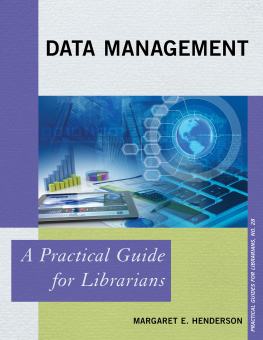

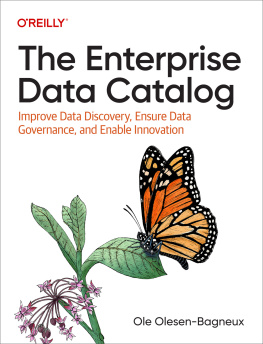
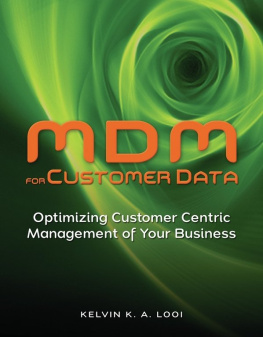
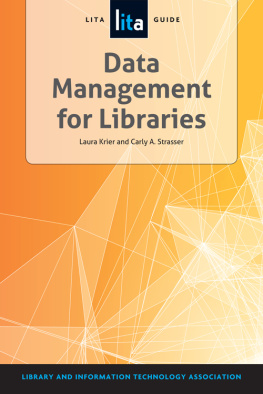
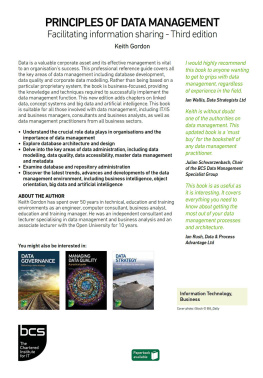


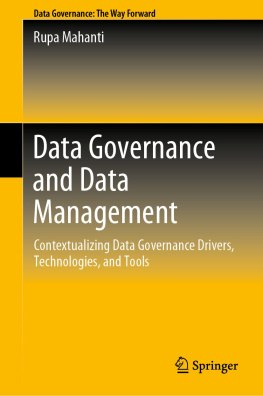
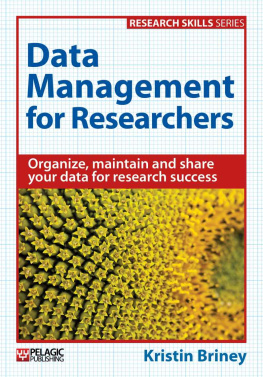
 About the Series
About the Series The paper used in this publication meets the minimum requirements of American National Standard for Information SciencesPermanence of Paper for Printed Library Materials, ANSI/NISO Z39.48-1992.
The paper used in this publication meets the minimum requirements of American National Standard for Information SciencesPermanence of Paper for Printed Library Materials, ANSI/NISO Z39.48-1992.